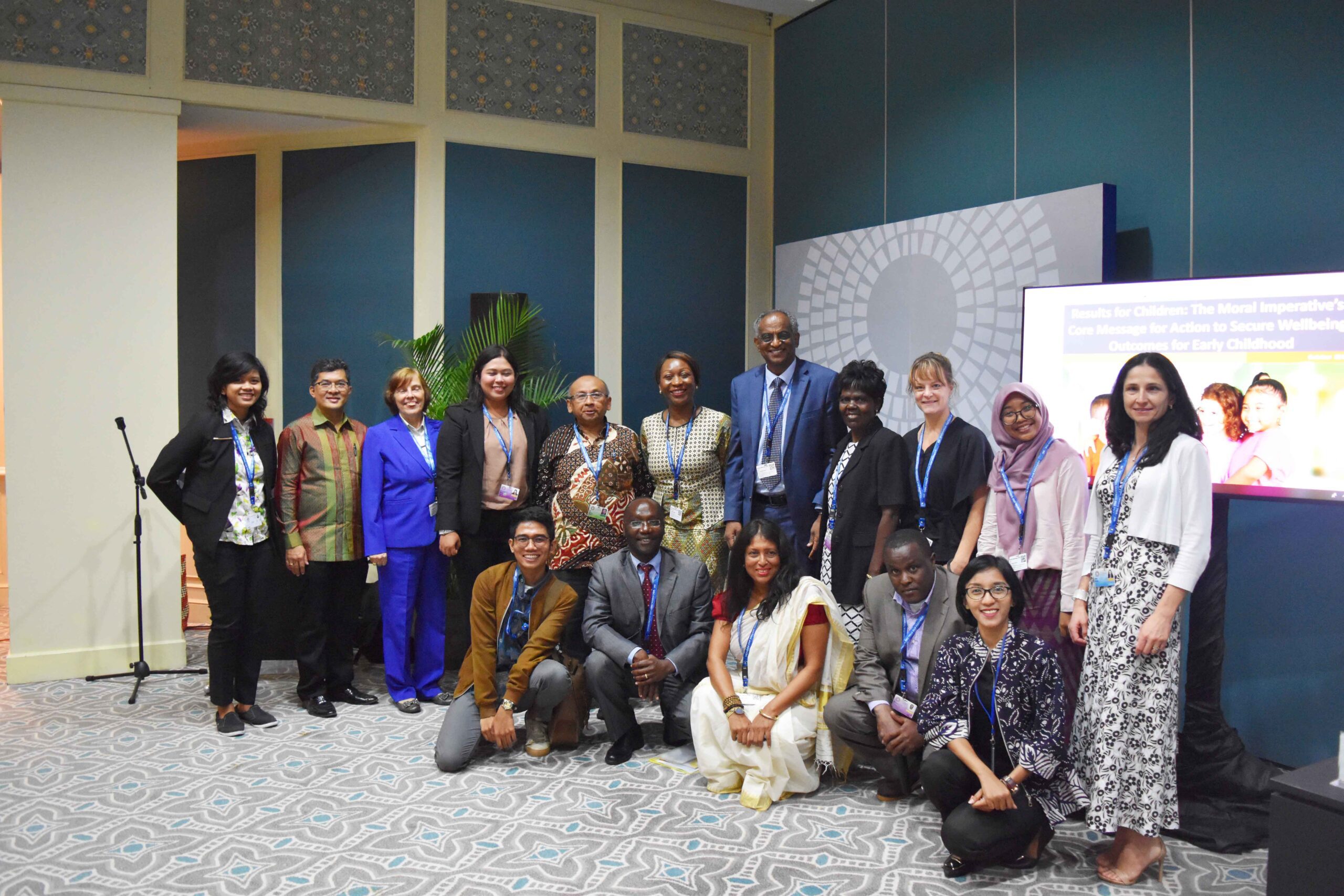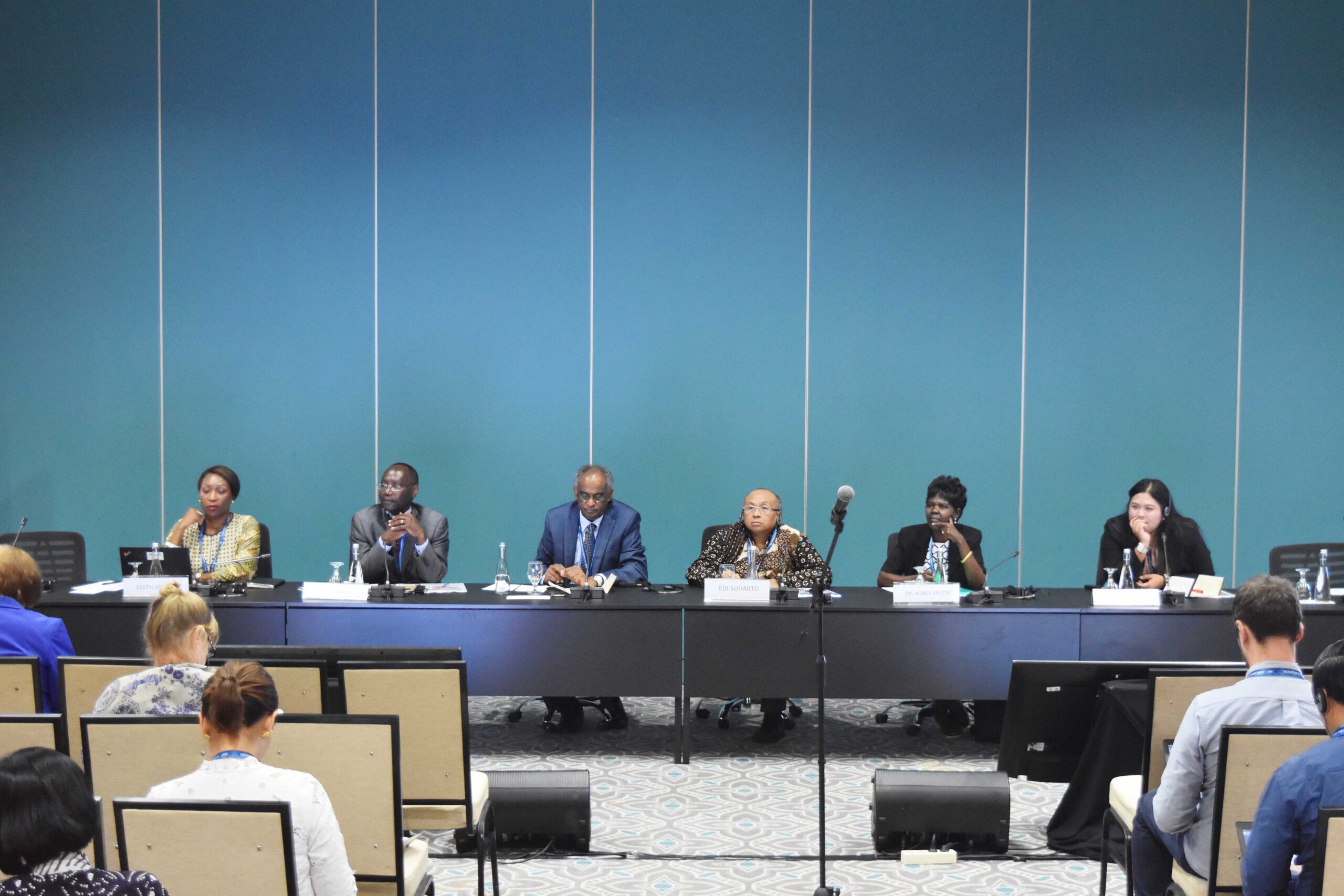
The Moral Imperative’s, “Results for Children: Faith Actors High Level Advocacy Forum in Investing in Early Childhood Development just went down, Bali, Indonesia.” The event, co-organized by the Moral Imperative to End Extreme Poverty and Arigatou International formed part of the Civil Society Organizations sessions at the just concluded joint Annual Meetings of the World Bank Group and the IMF, 9–12 October, at the Bali International Convention Centre. The Forum gathered more than forty participants.
The event, held on the 10th of October, consisted of a high level panel presentation and an open question and answer session. Through the forum, the Moral Imperative sought to draw attention to the high social and economic returns as well as the real cost of failing to invest in early childhood development to families, communities and societies.
The forum coincided with the World Bank’s launch of the Human Capital Project and a flagship Human Capital Development Index.. The Index provides a powerful new tool for states and faith inspired actors to make the case for much needed investment in core sectors charged with securing critical outcomes for human development. Participants at the forum welcomed this development noting that early childhood is the foundation of human development, and early childhood development offers the best secure start on the journey to developing human capital for the future.
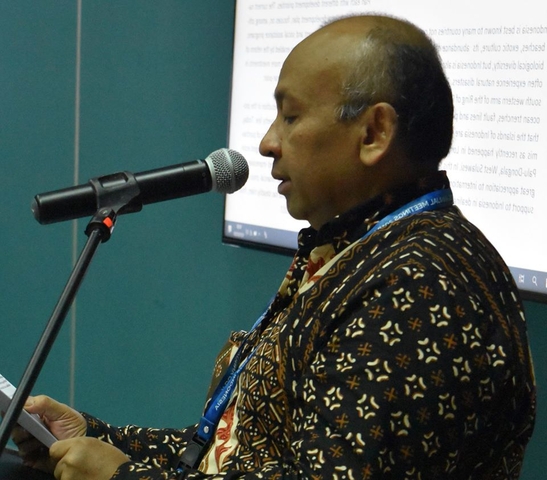
Speaking at the forum, Hon. Agus Gumiwang Kartasasmita, Minister for Social Affairs, Republic of Indonesia, declared that Indonesia has a strong believe in “having healthy, educated and happy children” and is bold in investment in early childhood development. The Minister called for well targeted and resourced social programmes in order to achieve ECD targets.
In a speech, delivered on his behalf by Mr. Edi Suharto, Director General for Social Rehabilitation, the Minister, informed participants that Indonesia has achieved an historic feat in reducing poverty through sustained economic growth and targeted social spending with significant positive outcomes for families and children.
(see Growth plus some: Indonesia Getting Results for Targeted Investing in Children)
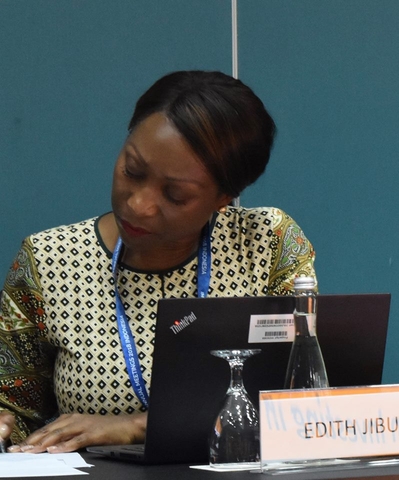
Ms. Edith Jibunoh, Manager for Global Stakeholder Engagement at the World Bank, urged faith inspired actors to seize the opportunities offered by the World Bank’s renewed focus on Human Capital Development for their own advocacy and investing in ECD.
Emphasizing the imperative and urgency to grow human capital, Ms. Jibunoh pointed to the irony of “a massive deficit” in human development despite “historic human development gains.”
Faith inspired actors, she noted, have an historic opportunity to spearhead scaling up investing in early childhood development through the agency of human capital development.
(see Faith Actors Challenged to Spearhead Advocacy for Greater Investment in Early Childhood Development)
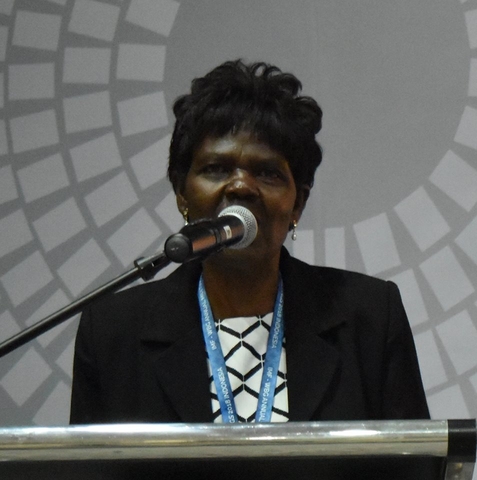
Dr. Agnes Abuom, Moderator of the World Conference of Churches and a member of Arigatou International’s Advisory Group, urged governments and communities to “re-imagine society and core public policy and services in order to reach out to and eliminate childhood adversity.” “It is morally unaccepted and a scandal, she said, that millions of children and families face utter deprivation and death while much of what we need to do to achieve wellbeing outcomes for children is known and within reach even for poor countries.”
Even though “a broad-based realignment is already underway” among faith inspired actors, faith and religious institutions must “review and realign long held traditions and teachings, reassess priorities in favour of children, and seek long drawn and deep partnerships” in order to deliver the best life outcomes for children.
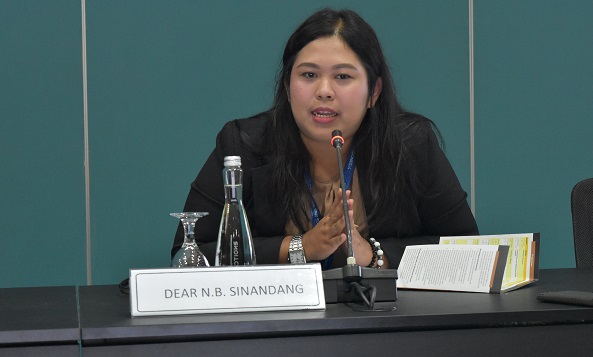 Speaking from the Indonesian national context, Ms. Dear Sinadang of the Humanitarian Forum Indonesia and the Joint Learning Initiative of Faith and Local Communities noted that religious institutions in Indonesia play a significant role in early childhood development such as building schools, health facilities, and providing support for livelihood activities for parents. Religious institutions also engage in providing community and family level services including counselling, spreading awareness about critical situations, tracking and uniting lost children with families and running emergency services in nutrition, health, education and shelter. Religious actors and institutions are also big on disaster risk reduction which is critical for preventing and stalling child poverty.
Speaking from the Indonesian national context, Ms. Dear Sinadang of the Humanitarian Forum Indonesia and the Joint Learning Initiative of Faith and Local Communities noted that religious institutions in Indonesia play a significant role in early childhood development such as building schools, health facilities, and providing support for livelihood activities for parents. Religious institutions also engage in providing community and family level services including counselling, spreading awareness about critical situations, tracking and uniting lost children with families and running emergency services in nutrition, health, education and shelter. Religious actors and institutions are also big on disaster risk reduction which is critical for preventing and stalling child poverty.
(see Investing in Children: Experiences and Challenges from Indonesia)
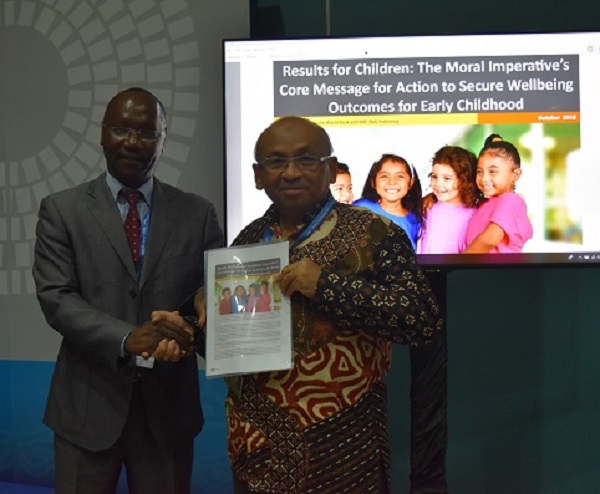 Presiding at the forum, Fred Nyabera, Director, End Child Poverty at Arigatou International, called on faith actors and faith communities to not only take up the historic opportunity to come to the aid of children, but to do so when the children are still young and stand to benefit the most.
Presiding at the forum, Fred Nyabera, Director, End Child Poverty at Arigatou International, called on faith actors and faith communities to not only take up the historic opportunity to come to the aid of children, but to do so when the children are still young and stand to benefit the most.
Pointing to the strength of collaboration and partnerships to solve seemingly intractable challenges, Rev. Nyabera thanked all those that responded to the call to the forum as resource persons, participants and other capacities. He also noted that it was not lost on the Moral Imperative, that the World Bank is placing a new emphasis on the role of human capital, noting further that this would present new areas of engagement between the bank and faith actors under the Moral Imperative. In his address, he also highlighted Arigatou International’s led the initiative on Nurturing Spirituality in Early Childhood for the Prevention of Violence Against Children.
(see Investing in Early Childhood Development a Step Towards Eradicating Childhood Adversity)
At the meeting, the Moral Imperative launched a conceptual route map for renewed engagement on Early Childhood Development. This route map advances a broad strategy and actions grounded on–
- a clear focus on wellbeing outcomes for the whole child;
- a sure start at the earliest;
- a moral indignation for poor outcomes for child development;
- a focus on bending and reforming institutions to work for and not against positive outcomes for children;
- an unequivocal commitment to delivering for children in state policy, law and programmes;
- an overarching vision and leadership on delivering to children;
- re-imagining parenting and its formative role for children, communities and societies;
- re-imagining and redesigning children’s services;
- acknowledging and mainstreaming the role of process and outcomes evidence and thus revamping data and statistics on children; and
- recognizing the strategic role of faith, its institutions and agency
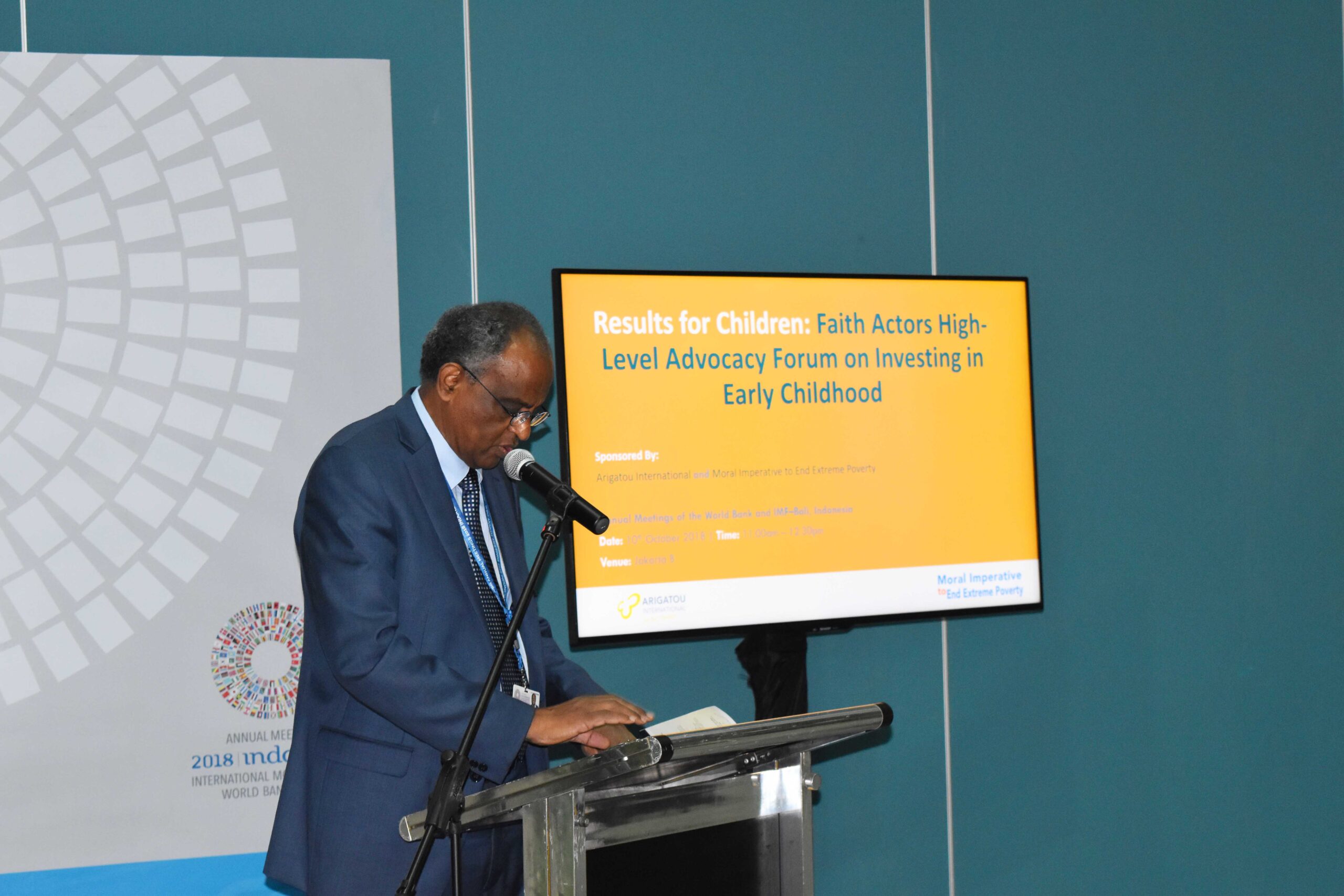 Also at the event were Dr. Asavari Herwadkar of the Ojuis Medical Institute and Mr. Mahdar Tahir of ICAN Malaysia.The event was moderated by Dr. Tageldin Hamad, Vice President and Director of Office of UN Relations for the United Peace Federation. He urged the participants and their networks to move towards operalisation of the Moral Imperative and strategic action in achieving results for children.
Also at the event were Dr. Asavari Herwadkar of the Ojuis Medical Institute and Mr. Mahdar Tahir of ICAN Malaysia.The event was moderated by Dr. Tageldin Hamad, Vice President and Director of Office of UN Relations for the United Peace Federation. He urged the participants and their networks to move towards operalisation of the Moral Imperative and strategic action in achieving results for children.
